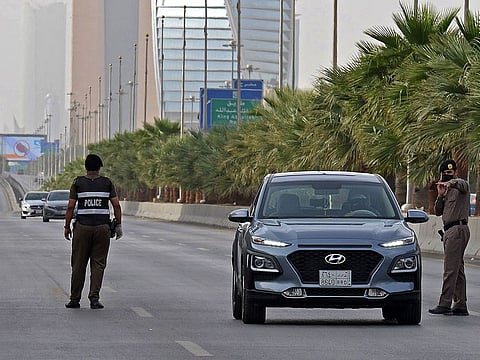Enforcement of traffic laws must in Saudi Arabia
Authorities need to further tighten road regulations in the kingdom

One of the more positive statistics to come out of the Covid-19 era which is closing in on a full year has been a decrease in road traffic accidents leading to fatalities in Saudi Arabia. Perhaps it was the period of lockdown, or the increased presence of traffic authorities on the road to ensure the virus protocol was being followed, one thing was certain. It brought the number of traffic deaths down.
In the last Traffic Safety Conference that was held in Riyadh before the Corona era, Saudi Arabia had one of the highest rates of road deaths in the world, with 28 people dying for every 100,000 population. When compared to countries like Sweden, the UK, and the Netherlands, where a greater driver scrutiny and awareness meant road deaths were only around three per 100,000 people, the difference in mortality rates is simply astounding!
On this subject, a Saudi mother reached out to me with concerns about one of her sons who was reaching that age when all boys are eager and ready to slide in behind the wheels of an automotive and let loose on the accelerator, and her anxieties on the dangers such young souls face or put themselves through on our roads was very evident.
However, being a proactive mom, she was sounding off an idea she had had on her mind for some time. “I want to start an association of mothers against destructive driving. Each one of us has either known of or heard some young man losing his life tragically behind the wheel. Heavens know how many such heartbreaking funeral wakes I have personally attended.”
She brought up the organisation MADD (Mothers against drunken driving) in the States that was started by a mother who lost her 13-year-old daughter to a hit and run drunken driver in California back in 1980. Over the years and through her efforts, she managed to get several bills passed through Congress against such reckless fatalities.
She continued, “Statistics from 1980 show a decline in such road deaths by over fifteen thousand individuals for which MADD has been credited. Here in this country, we are not speaking of drunk drivers but rather destructive ones who have no concept of road safety or defensive driving, and specifically our youth.”
In an action plan, this Saudi lady proposed to get some mothers together to form a loose association and begin by handing out leaflets on busy street corners promoting safe driving behind the wheels.
“We can also seek out peer groups from the youth who have suffered some disabilities through car accidents and have them gather them in front of an audience of young drivers. Let our kids see for themselves the effects of such road folly and perhaps the message will sink in deeper. Speed maims if not kills in many cases, and it’s unfortunately for life.”
“Taking it beyond that, mothers could petition their high school students’ schools to hold such forums at least twice a year to expose young drivers to the pitfalls of rash and destructive driving. Mothers could also insist that the schools provide automotive classes where driving safety and traffic laws are taught, understood and encouraged.”
“I have contacted a few mothers and they are eager to come on board on such a venture. This could potentially be a grass-root organisation that would be of great benefit to the citizens of tomorrow. A Saudi MADD if you will, one whose only purpose is to ensure the safety and security of our children once they are ready to drive.”
I have to applaud this Saudi lady for such resolute thought. It is a fact that some of the most horrible and heart-wrenching road accidents have involved the young in this country. Adolescent lives snuffed out in brief seconds; wasted and all for what?
The government can help our youth by tightening its enforcement of traffic laws and making the issuance of a driver licence far more difficult than manoeuvring through cones on a parking lot. It has set a target to reduce road-related fatalities to eight per 100,000 as part of the government’s Vision 2030 program. To help them get there, mandatory road testing by qualified inspectors is necessary before driver licences are authorised.
But the government alone should not be held responsible, as parents have to play a much greater part in ensuring that their loved ones are educated enough and responsible enough to be left alone behind the wheels. Parents must be aware of their children’s driving habits and activities for they could hurt not just themselves but other innocent passengers. Parents should also take heed when gifting their young with vehicles with enough power to match small jet engines.
For if this cannot or will not be done, just dwell on the consequences. Sooner or later, a loved one would pay the supreme price.
— Tariq A. Al Maeena is a Saudi sociopolitical commentator. He lives in Jeddah, Saudi Arabia. Twitter: @talmaeena
Sign up for the Daily Briefing
Get the latest news and updates straight to your inbox






